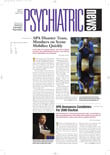The case is building that an enlarged pituitary gland can predict the onset of psychosis in persons at high risk for psychosis.
The research comes from Carmine Pariante, M.D., Ph.D., a senior lecturer at the Institute of Psychiatry in London, and colleagues.
The researchers compared the pituitary gland volumes of 24 subjects with first-episode psychosis who were taking an antipsychotic medication with those of 59 healthy volunteers.
As the researchers reported in the July 2004 British Journal of Psychiatry, the former group had pituitary gland volumes that were 10 percent larger, suggesting that an enlarged pituitary gland might be associated with the onset of psychosis.
Pariante and colleagues then compared the pituitary gland volumes of 78 subjects with first-episode psychosis—some of whom were taking an antipsychotic and some of whom were not—with the pituitary gland volumes of 78 healthy controls.
Compared with controls, first-episode psychosis subjects not receiving an antipsychotic medication had pituitary glands that were 15 percent larger, subjects receiving second-generation antipsychotics had pituitary glands that were 17 percent larger, and subjects receiving first-generation antipsychotics had pituitary glands that were 30 percent larger.
Thus, “an enlarged pituitary is present independently of the effects of the antipsychotics,” the researchers concluded in the June Neuropsychopharmacology, “but. .activation of prolactin-secreting cells by [first-generation antipsychotics] may cause an additional enlargement of the pituitary.”
Finally, the researchers measured the pituitary gland volumes of 94 subjects at high risk of developing psychosis who were not taking an antipsychotic medication. These were individuals with attenuated psychotic symptoms such as unusual thoughts or hallucinations, transient psychotic symptoms, or a first-degree relative with a psychotic disorder and a reduction in general functioning. The investigators then followed them for at least a year to see whether they developed psychosis.
About one-third of the subjects went on to develop psychosis, and they had significantly larger pituitary glands at baseline—about 12 percent larger—than did subjects who did not develop psychosis.
Thus, an enlarged pituitary gland in persons at high risk of psychosis seems to be “highly predictive of future transition to psychosis,” Pariante and colleagues concluded in this latest study report, which was published in the September Biological Psychiatry.
A possible reason why, they speculated, is that a subject in danger of developing psychosis is distressed—for example, by encroaching psychosis or by daily life stress— and the stress in turn activates the pituitary hormone ACTH, and ACTH activation then increases the number and size of pituitary gland cells that produce ACTH.
More provocatively, the researchers suggested that if the stress response in persons at very high risk of psychosis could be dampened, then it's possible that those individuals might not make the transition to psychosis. In short, “Preventing or reducing the stress response in the prodromal phase could potentially alter the trajectory to psychosis,” they said.
Enlarged pituitary glands have also been found in some subjects with early-onset major depression (Psychiatric News, August 6, 2004).
The three studies conducted by Pariante and colleagues were funded by the United Kingdom Medical Research Council, the Guy's and St. Thomas' Charitable Foundation, the National Alliance for Research on Schizophrenia and Depression, and several other organizations.
An abstract of “Pituitary Volume in Psychosis” is posted at<http://bjp.rcpsych.org/cgi/content/abstract/185/1/5?>;“ Increased Pituitary Volume in Antipsychotic-Free and Antipsychotic-Treated Patients of the AESOP First-Onset Psychosis Study” is posted at<www.acnp.org/citations/NPP041105050019/default.pdf>; an abstract of “Pituitary Volume Predicts Future Transition to Psychosis in Individuals at Ultra-High Risk of Developing Psychosis” can be accessed at<www.journals.elsevierhealth.com/periodicals/bps> by clicking on the September issue. ▪
Br J Psychiatry 2005 185 5
